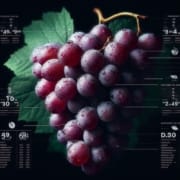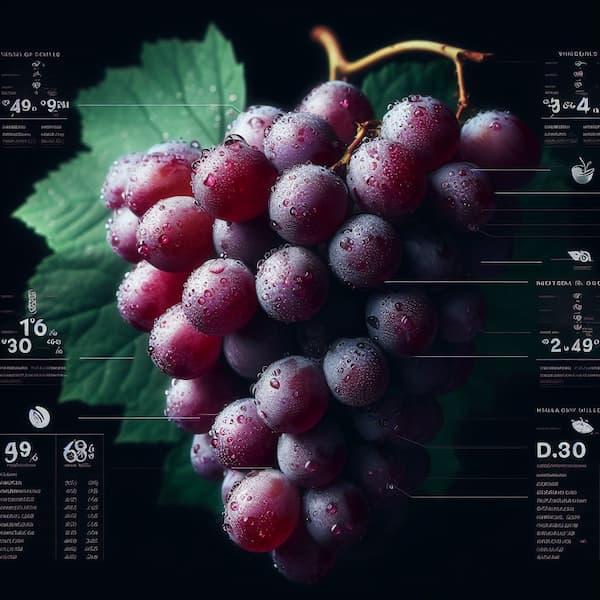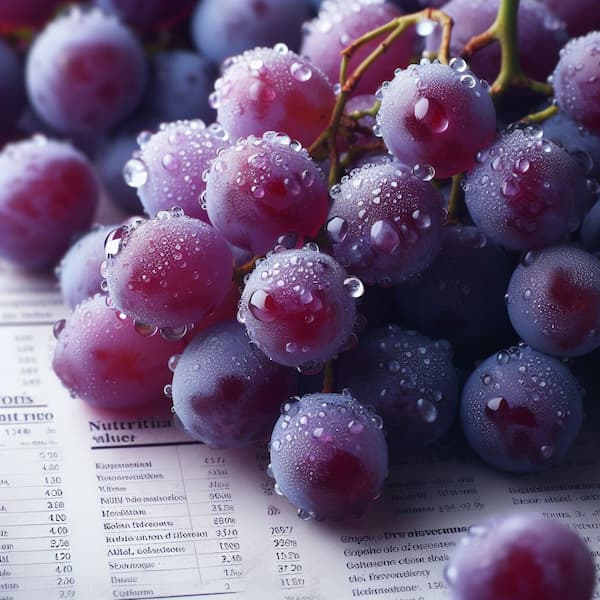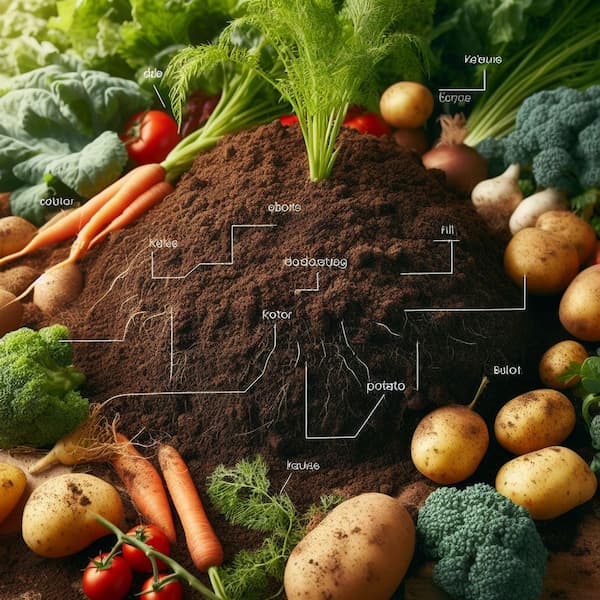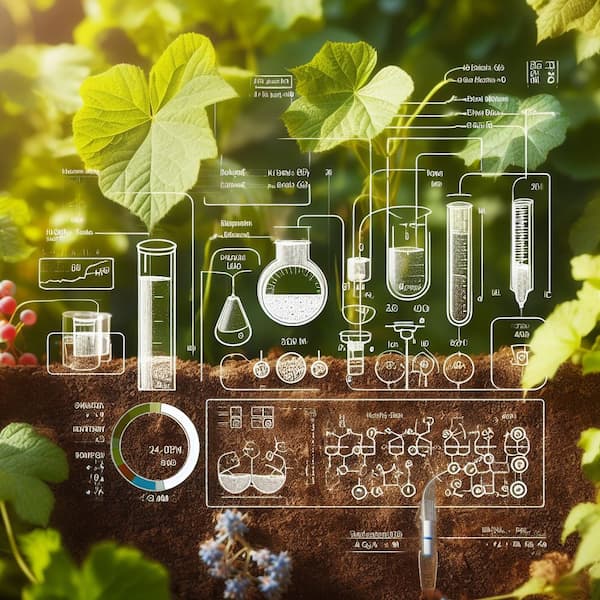Potassium in grapes: an essential nutrient for quality and yields
Potassium is an essential nutrient for plant growth and development. In grapes, potassium plays an important role in photosynthesis, protein synthesis and regulation of osmotic balance. It is also necessary for the transport of water and nutrients through the plant.
The potassium content of grapes varies according to variety, climate and growing conditions. Red grapes usually have a slightly higher potassium content than white grapes.
Potassium is the soul of the grape.
Importance of potassium for grape quality
Potassium is an essential nutrient for grape quality. A good supply of potassium helps grapes develop a rich color, sweet flavor and firm texture.
In particular, potassium helps to:
- Increasing sugar content in grapes
- Improving the coloration of red grapes
- Increasing grape firmness
- Reduce the incidence of disease
A grape with a good supply of potassium is a happy grape.
Importance of potassium for grape production
Potassium is also important for grape production. A good supply of potassium helps plants resist adverse conditions such as drought and frost.
In particular, potassium helps to:
- Increasing drought resistance
- Increasing frost resistance
- Improve stress tolerance
Methods of analysis of potassium in grapes
There are several methods for analyzing the potassium content of grapes. The most common methods are:
- Colorimetric method: This method is based on the reaction of potassium with a solution of sulfuric acid and cobalt chloride. The color intensity of the solution is measured to determine the potassium content.
- Conductimetric method: This method is based on the measurement of the electrical conductivity of a grape solution. The potassium content is determined from the conductivity.
- Spectrophotometric method: This method is based on the measurement of light absorption by a grape solution. Potassium content is determined from absorption.
The NT Sensors potassium meter is the perfect tool for grape growers who want to ensure that their grapes have a good supply of potassium.
Potassium is an essential nutrient for grape growth, development and quality. A good supply of potassium helps plants produce high quality, high yielding grapes.
Addition of potassium to grapes
Potassium can be added to grapes by fertilizing. Potassium fertilization is usually done in spring, when the plants are in full growth phase.
The most common potassium fertilizers are potassium sulfate and potassium chloride. Potassium sulfate is the most commonly used potassium fertilizer because it is less soluble in water than potassium chloride.
The amount of potassium to be added to grapes depends on the variety, climate and growing conditions. In general, it is recommended to add between 200 and 400 kg of potassium sulfate per hectare.
Potassium deficiency in grapes
Potassium deficiency in grapes is manifested by the following symptoms:
- Yellowing or chlorotic leaves
- Rolled leaf edges
- Small berries with little pulp
Potassium deficiency can reduce grape yield and quality.
Excess potassium in grapes
Excess potassium in grapes can cause the following symptoms:
- Slow plant growth
- Leaf discoloration
- Low fruit production
Excess potassium can also reduce the absorption of other nutrients, such as calcium and magnesium.
Benefits of using a potassium meter
The use of a potassium meter is an essential tool for grape growers. A potassium meter allows growers to accurately determine the potassium content of grapes.
The use of a potassium meter offers the following benefits:
- Improves grape quality: A good supply of potassium helps grapes develop intense color, sweet flavor and firm texture.
- Increases yield: Grapes with a good supply of potassium are more resistant to disease and stress, which can lead to higher yields.
- Reduce costs: Using a potassium meter can help growers avoid over- or under-application of fertilizer, which can save money.
Potassium meter from NT Sensors
The NT Sensors potassium meter is a portable, easy-to-use device that allows grape growers to accurately determine the potassium content of grapes. The meter uses state-of-the-art ion selective electrode (ISE) technology for exceptional accuracy and reliability.
NT Sensors potassium meter features:
- Accuracy: The NT Sensors potassium meter is accurate to ± 0.1%.
- Reliability: The NT Sensors potassium meter is designed to last for years.
- Portability: The NT Sensors potassium meter is lightweight and compact, making it ideal for use in the field.
- Ease of use: The NT Sensors potassium meter is easy to use and requires no special training.
Benefits of the NT Sensors potassium meter:
- Improves grape quality: NT Sensors’ potassium meter helps growers ensure that their grapes have a good supply of potassium, which translates into high quality grapes.
- Increases yield: NT Sensors’ potassium meter helps growers optimize fertilizer application, which can lead to higher yields.
- Reduce costs: NT Sensors’ potassium meter helps growers avoid over- or under-application of fertilizer, which can save money.
Potassium is the nutrient that gives grapes their flavor, color and texture.
Potassium is an essential nutrient for grape growth, development and quality. The use of a potassium meter is an essential tool for grape growers to accurately determine the potassium content of grapes. The NT Sensors potassium meter is a portable, easy-to-use device that offers exceptional accuracy and reliability.
Synonymy:
- Potassium:
- Potash
- K
- Potassium ion
- Alkaline earth
- Alkaline earth metal
- Chemical element
- Nutrient:
- Potassium in grapes
- Potassium content in grapes
- Potassium level in grapes
- Potassium concentration in grapes
- Determination of potassium in grapes
Potassium is an essential nutrient for plant growth and development. In grapes, potassium plays an important role in photosynthesis, protein synthesis and regulation of osmotic balance. It is also necessary for the transport of water and nutrients through the plant.
The potassium content of grapes varies according to variety, climate and growing conditions. Red grapes usually have a slightly higher potassium content than white grapes.
Potassium is the soul of the grape.
Importance of potassium for grape quality
Potassium is an essential nutrient for grape quality. A good supply of potassium helps grapes develop a rich color, sweet flavor and firm texture.
In particular, potassium helps to:
- Increasing sugar content in grapes
- Improving the coloration of red grapes
- Increasing grape firmness
- Reduce the incidence of disease
A grape with a good supply of potassium is a happy grape.
Importance of potassium for grape production
Potassium is also important for grape production. A good supply of potassium helps plants resist adverse conditions such as drought and frost.
In particular, potassium helps to:
- Increasing drought resistance
- Increasing frost resistance
- Improve stress tolerance
Methods of analysis of potassium in grapes
There are several methods for analyzing the potassium content of grapes. The most common methods are:
- Colorimetric method: This method is based on the reaction of potassium with a solution of sulfuric acid and cobalt chloride. The color intensity of the solution is measured to determine the potassium content.
- Conductimetric method: This method is based on the measurement of the electrical conductivity of a grape solution. The potassium content is determined from the conductivity.
- Spectrophotometric method: This method is based on the measurement of light absorption by a grape solution. Potassium content is determined from absorption.
The NT Sensors potassium meter is the perfect tool for grape growers who want to ensure that their grapes have a good supply of potassium.
Potassium is an essential nutrient for grape growth, development and quality. A good supply of potassium helps plants produce high quality, high yielding grapes.
Addition of potassium to grapes
Potassium can be added to grapes by fertilizing. Potassium fertilization is usually done in spring, when the plants are in full growth phase.
The most common potassium fertilizers are potassium sulfate and potassium chloride. Potassium sulfate is the most commonly used potassium fertilizer because it is less soluble in water than potassium chloride.
The amount of potassium to be added to grapes depends on the variety, climate and growing conditions. In general, it is recommended to add between 200 and 400 kg of potassium sulfate per hectare.
Potassium deficiency in grapes
Potassium deficiency in grapes is manifested by the following symptoms:
- Yellowing or chlorotic leaves
- Rolled leaf edges
- Small berries with little pulp
Potassium deficiency can reduce grape yield and quality.
Excess potassium in grapes
Excess potassium in grapes can cause the following symptoms:
- Slow plant growth
- Leaf discoloration
- Low fruit production
Excess potassium can also reduce the absorption of other nutrients, such as calcium and magnesium.
Benefits of using a potassium meter
The use of a potassium meter is an essential tool for grape growers. A potassium meter allows growers to accurately determine the potassium content of grapes.
The use of a potassium meter offers the following benefits:
- Improves grape quality: A good supply of potassium helps grapes develop intense color, sweet flavor and firm texture.
- Increases yield: Grapes with a good supply of potassium are more resistant to disease and stress, which can lead to higher yields.
- Reduce costs: Using a potassium meter can help growers avoid over- or under-application of fertilizer, which can save money.
NT Sensors Potassium Meter
The NT Sensors potassium meter is a portable, easy-to-use device that allows grape growers to accurately determine the potassium content of grapes. The meter uses state-of-the-art ion selective electrode (ISE) technology for exceptional accuracy and reliability.
NT Sensors potassium meter features:
- Accuracy: The NT Sensors potassium meter is accurate to ± 0.1%.
- Reliability: The NT Sensors potassium meter is designed to last for years.
- Portability: The NT Sensors potassium meter is lightweight and compact, making it ideal for use in the field.
- Ease of use: The NT Sensors potassium meter is easy to use and requires no special training.
Benefits of the NT Sensors potassium meter:
- Improves grape quality: NT Sensors’ potassium meter helps growers ensure that their grapes have a good supply of potassium, which translates into high quality grapes.
- Increases yield: NT Sensors’ potassium meter helps growers optimize fertilizer application, which can lead to higher yields.
- Reduce costs: NT Sensors’ potassium meter helps growers avoid over- or under-application of fertilizer, which can save money.
Potassium is the nutrient that gives grapes their flavor, color and texture.
Potassium is an essential nutrient for grape growth, development and quality. The use of a potassium meter is an essential tool for grape growers to accurately determine the potassium content of grapes. The NT Sensors potassium meter is a portable, easy-to-use device that offers exceptional accuracy and reliability.
Synonymy:
- Potassium:
- Potash
- K
- Potassium ion
- Alkaline earth
- Alkaline earth metal
- Chemical element
- Nutrient:
- Potassium in grapes
- Potassium content in grapes
- Potassium level in grapes
- Potassium concentration in grapes
- Determination of potassium in grapes

